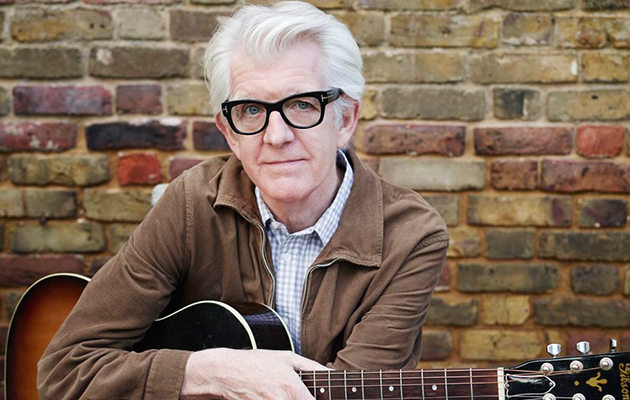UNCUT: Was it weird making a Christmas album in the spring?
NICK LOWE: I thought we might have to festoon the studio with holly as I have always swallowed the idea that people made Christmas albums at Christmas, which is obviously impossible. But once you start, it’s a mere job of work. There are some originals, some obscurities. I didn’t know Roger Miller’s “Toy Trains” but apparently it’s much loved in America. I co-wrote “A Dollar Short Of Happy” with Ry Cooder and asked Ron Sexsmith for something and he sent “Hooves On The Roof”.
Then there’s a de-glammed Wizzard’s “I Wish It Could Be Christmas Everyday”.
If not the Mount Everest that’s certainly the K2 of Christmas pop singles but I never heard a cover of it. We took out every other chord and found we had a result. These days there isn’t really any such thing as a hit Christmas pop single as there was in the 1970s, it’s just what Simon Cowell says it’s going to be. I think the last ones to enter the canon are Cliff’s “Mistletoe And Wine”, The Pogues’ “Fairytale Of New York” and Chris Rea’s “Driving Home For Christmas”, and they are all back in the 1980s.
There are also spirituals, which hint at a Christian streak. You wrote “Far Celestial Shore” for Mavis Staples’ recent album. How did that come about?
I met Mavis when I was on tour with Wilco. Jeff Tweedy, who produced both her recent albums, asked me to write something. I was raised an Anglican, I love gospel music and the language of The Bible, so it’s not a great leap, but I can’t participate. I heard Craig Ferguson say ‘I am the sort of person who can be moved to tears in an empty church, but become an atheist in a full one’, which I totally identify with.
I’d like to loop back and talk about the days after what you call the ‘pub rock wars’, when you, Jake Riviera and Dave Robinson started Stiff…
The band Jake managed, Chilli Willi, had broken up and the writing was on the wall for my band, Brinsley Schwarz. It wasn’t a bad-natured break-up. We had been sharing a house in Beaconsfield which was fantastic, like going to college, we had our own rehearsal room there. But we’d had our breaks, like opening for Wings, and nothing had happened. I woke up and thought I’m 26 now, too old for this. I was spending a lot of time with Jake, and we knew something was coming, sensed it. We had friends in New York and the scene there had caught fire, though it was much more arty and serious than what arrived here. A voice seemed to say “It’s your turn! Step forward, you’re next!” We looked at the mainstream and thought, “We’re not joining, if it’s our time we are gonna do something different.” I’d had enough of drippy singer-songwriters and hopeless blues boogie bands trying to copy Dr Feelgood. Jake looked round for a record deal but what was on offer didn’t make my pulses race. What they wanted for me I didn’t want for myself.
Although you cut the first Stiff single, “So It Goes”/ “Heart Of The City”, your initial input was principally as producer, wasn’t it?
Yes, I was co-opted as part of management. I became house producer simply by having been in more studios than Jake or Dave. They had tons of ideas how records should sound but I got the gig, they were busy managing and conceptualising. Elvis Costello, The Damned, Wreckless Eric and more – where were those records cut? In Pathway, a tiny studio in Stoke Newington. It was like a garage. It had been Oswald Mosley’s lock-up, where the Blackshirts kept their pamphlets and placards! It had a great engineer, Barry Farmer, who had pretty much built the place. It was completely analogue, all glowing valves, and was boiling hot in the summer and freezing cold in the winter, but it had a fantastic sound.
What did your job as a producer entail back then?
It was still old-school, in the sense that if you said you were a producer forcefully enough people believed you. You didn’t have to know how to actually work the equipment. I didn’t do much knob twiddling but I was good at telling the engineer what I wanted to hear, and at energising people, figuring out what they wanted to do, and at discovering where the creativity in a band lay – that it wasn’t necessarily with the loud-mouthed lead singer but with the shy bass player. I wasn’t always right, I made bad decisions, but I was full of myself and the more people wrote how good I was, the more I believed it. It was an exciting time because for a while the monkeys took over the zoo. Suddenly big heads started to roll in the major labels. People who we thought were ruining the music scene were clearing their desks. Goodbye! Then they got in hip-looking guys, though they weren’t really hip, and the majors wrested back control.
This was when you acquired the ‘Basher’ Lowe nickname?
Popularly because I was quoted as saying production was “Bash it down and tart it up later.” But the actual reason was Dr Feelgood. Because my father was in the RAF, they’d say [adopting Dam Busters voice] “Basher, bandits at 12 0 clock,” taking the piss.


